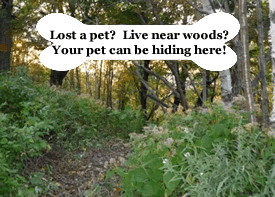Do you live near a wooded area?
Your pet can be hiding there.
If you have lost your pet and you live in close proximity of a wooded area such as a preserve or park, it is imperative that you include this space in your search efforts.
 Animals are drawn to wooded areas due to the many unique, different scents there from other domestic and wild animals. Although this will make your search efforts that much more intricate, it is important that you cover this area. A densely wooded park will offer a frightened pet a variety of hiding opportunities and shelter. Plan to search at dawn and dusk when it is quiet and your pet will feel more secure coming out to look for food or water. Animals are drawn to wooded areas due to the many unique, different scents there from other domestic and wild animals. Although this will make your search efforts that much more intricate, it is important that you cover this area. A densely wooded park will offer a frightened pet a variety of hiding opportunities and shelter. Plan to search at dawn and dusk when it is quiet and your pet will feel more secure coming out to look for food or water.
Be sure to contact the Parks Department and the Park Ranger's office for that particular town to let them know your pet is missing in the park. Try to fax a flyer to their office so that they have a description of your pet. Hopefully if they patrol the area, they may be able to offer you leads and sightings.
When you search keep in mind your pet will most likely come out of hiding early mornings and at dusk/night. Bring food (ie. bacon, chicken, hot dogs), water, a collar and leash, a favorite squeak toy, whatever you think may encourage him to come to you. The smell of bacon cooking on a small portable travel grill may entice your pet near. Try it! Lay out worn unwashed clothing items, a slept on blanket to help him pick up your scent. If you have another dog, bring him along securely leashed with ID, as this may help to draw your pet to you as well. If your pet is skittish and you have a definitive sighting of your pet in a particular area, you may want to consider enlisting the help of someone that can lure and hopefully TRAP your missing pet.
If you search at night, you should bring a flashlight with you, shining it into the brush to hopefully catch a glimpse of his eyes reflecting back at you.
Do NOT use a 4-wheel Quad or the like to search as the noise will drive your pet away from where he may have set up camp, or prevent him from coming out at all.
Search Smart
Winter: If you are searching for your pet during the winter months, although the temperatures may be extreme, (be sure to dress appropriately to prevent Hypothermia and Frostbite-consider carrying hand warmers that may be purchased where sporting goods are sold), the search may be somewhat easier as the thicket will not be as dense with foliage, and there shouldn't be any concerns with ticks and mosquitoes carrying diseases. Be sure to look for signs of paw prints in the snow that can be tracked and bring you closer to your pet or the area in which he is staying.
Again, if you find the general vicinity your pet is staying in, a trap may be needed to capture him or her. Also, hopefully you can recognize the size of your pet's print as other animals leave prints as well. Keep that in mind! Never travel and search alone. Know your surroundings.
Your safety comes first!
We highly recommend that you do not search a densely wooded area alone!
**IMPORTANT*** Make sure someone at home knows the vicinity you and your party are searching and that you are carrying:
- a charged cell phone at all times
- as well as a portable cell charger
- a flashlight
- a first aide kit
- and a whistle, which can be heard from quite a distance should you need to bring attention to yourself.
In an emergency, contact 911 immediately. Better to play it safe than sorry. A situation could go from bad to worse in a short period of time should you get lost or hurt. Consideration should be given to the potential of encountering wildlife, depending upon where you live, and other potential hazards that come along with the outdoor territory as well as things such as poisonous plants, i.e. ivy, oak, sumac, and ticks, mosquitoes, snakes, etc., in the warmer months. Bug spray may come in handy.
Be careful! Be smart!
If you have a sighting
Bianca Bellelli reports:
It is likely that your pet, after so many days outdoors, will NO longer respond the way he/she did at home. in fact it takes as little as 2-3 days for their behaviour to change... your best bet is to put a trap with food in the evening in areas such as the one in the pic and check every 2-3 hours. DON'T leave the trap for longer without checking!! A wild animal could be caught and would go crazy if left longer!! Release them in this case and try again. (Thanks for the tip Bianca Bellelli)
|
|

